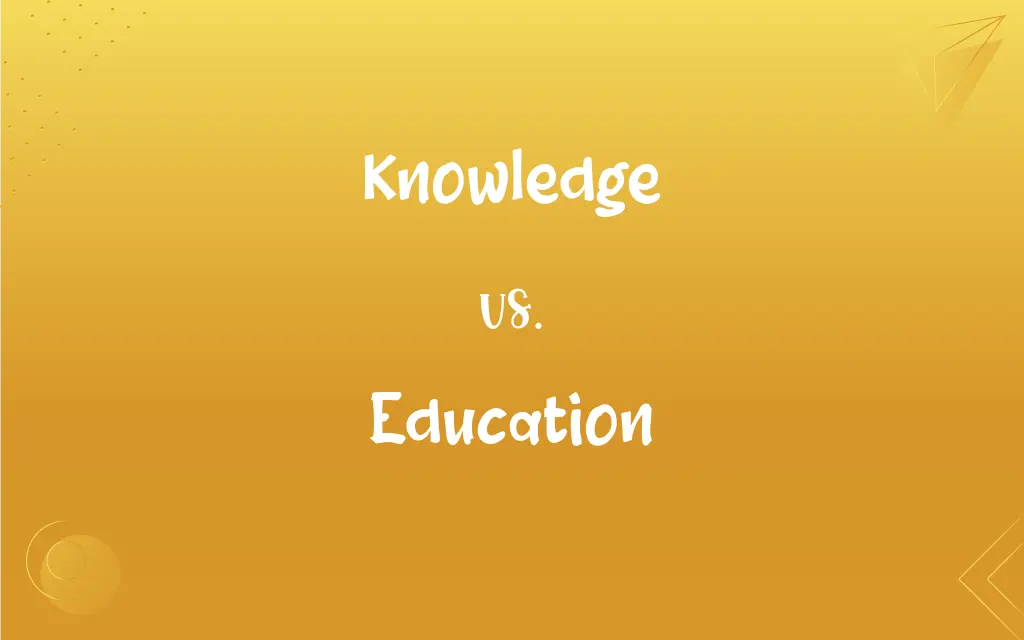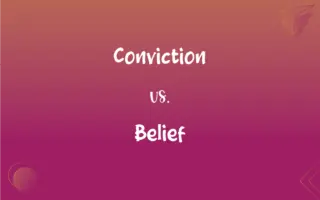Knowledge vs. Education: What's the Difference?
Edited by Aimie Carlson || By Harlon Moss || Published on December 2, 2023
Knowledge is the information, understanding, and skills acquired through experience or education, whereas education is the process of receiving or giving systematic instruction, especially at a school or university.

Key Differences
Knowledge encompasses facts, information, and skills acquired through experience or education, reflecting a person's understanding or awareness of specific subjects. Education, on the other hand, is the systematic process of facilitating learning, or the acquisition of knowledge, skills, values, and habits.
Knowledge can be theoretical or practical, and it develops over time through personal experiences, reading, and observation. Education is a structured and formalized approach to learning, typically provided by schools, colleges, and universities.
Knowledge is often subjective and can vary widely from person to person, depending on their experiences and interpretations. Education, in contrast, follows a curriculum and aims to impart a standardized set of knowledge and skills to students.
Knowledge can exist independently of formal education and can be self-acquired or innate. Education is a formal process that often requires guidance from educators and a learning environment like a classroom.
Knowledge and education are interconnected; education is a pathway to acquiring knowledge, while knowledge is the end product of the educational process. Both are essential for personal growth and societal development.
ADVERTISEMENT
Comparison Chart
Definition
Information, skills, and understanding obtained through experience or education.
The process of receiving or giving systematic instruction, typically at an educational institution.
Source
Can be acquired through life experiences, self-learning, as well as formal education.
Primarily acquired through structured learning and formal teaching.
Nature
Often subjective and varies based on individual experiences.
Structured and often standardized in curriculum and teaching methods.
Dependency
Can exist independently of formal education.
Requires a formal setting and institutional structure.
Purpose
Enhances understanding and personal growth.
Provides a foundation for acquiring knowledge, skills, and qualifications.
ADVERTISEMENT
Knowledge and Education Definitions
Knowledge
Knowledge is the understanding of or information about a subject gained through experience or education.
His extensive knowledge of history made him an excellent teacher.
Education
Education refers to the theory and practice of teaching and learning.
He devoted his life to the education of children.
Knowledge
Knowledge is the theoretical or practical understanding of a subject.
His deep knowledge of engineering principles helped solve complex problems.
Education
Education is the process of receiving or giving systematic instruction, especially at a school or university.
Her education at the prestigious university prepared her for a successful career.
Knowledge
Knowledge refers to the facts, information, and skills acquired through experience or education.
The knowledge she gained while traveling was invaluable.
Education
Education encompasses the activities of educating or instructing; activities that impart knowledge or skill.
The government increased its budget for education.
Knowledge
Knowledge encompasses the sum of what is known, encompassing the body of truths, facts, and principles.
The internet has become a vast source of knowledge on virtually every topic.
Education
Education is a formal and structured process of teaching and learning.
The new curriculum aims to improve the quality of education.
Knowledge
Knowledge is awareness or familiarity gained by experience of a fact or situation.
Her knowledge of local customs helped her adapt to the new country.
Education
Education is an enlightening experience of acquiring knowledge and skills.
The workshop was an important part of her continuing education.
Knowledge
The state or fact of knowing
Humans naturally aspire to knowledge.
Education
The act or process of educating or being educated.
Knowledge
Familiarity, awareness, or understanding gained through experience or study
Has great knowledge of these parts.
Has only limited knowledge of chemistry.
Education
The knowledge or skill obtained or developed by a learning process.
FAQs
What is the essence of knowledge?
Knowledge is the understanding and information gained through experiences or education.
How is knowledge shared?
Knowledge can be shared through communication, teaching, writing, and various forms of media.
Is knowledge always accurate?
Knowledge may not always be accurate and can be influenced by personal biases.
What is the purpose of education?
Education aims to facilitate learning, imparting knowledge, skills, values, and habits.
How does education contribute to career development?
Education provides the necessary skills and qualifications for various careers and professional growth.
Can education shape beliefs and values?
Yes, education can significantly influence an individual's beliefs, values, and worldview.
What role does education play in society?
Education plays a crucial role in societal development, economic growth, and cultural advancement.
Can knowledge be self-taught?
Yes, knowledge can be acquired through self-teaching and personal experiences.
Does knowledge change over time?
Yes, knowledge can evolve and expand with new experiences and information.
What is experiential knowledge?
Experiential knowledge is the understanding gained through direct personal experiences.
Is formal education necessary for success?
While formal education can be beneficial, success can also be achieved through various non-traditional educational paths and experiences.
Is education only obtained in schools?
While schools are primary centers for education, it can also occur in other settings like home, work, and through self-study.
Is education the same worldwide?
Education systems and curricula vary significantly across different countries and cultures.
What is the relationship between knowledge and intelligence?
Intelligence is the ability to acquire and apply knowledge and skills.
How do cultures influence knowledge?
Cultural beliefs, values, and practices can significantly shape the type and perception of knowledge.
Can knowledge be forgotten?
Yes, without regular use or reinforcement, knowledge can be forgotten.
Can education reduce societal inequalities?
Yes, accessible and quality education can be a key factor in reducing social and economic inequalities.
Are all forms of knowledge valuable?
The value of knowledge can be subjective and varies based on its application and context.
How is education evolving with technology?
Technology is significantly transforming education through online learning platforms, digital resources, and interactive teaching methods.
What is lifelong education?
Lifelong education is the continuous pursuit of learning and development throughout an individual's life.
About Author
Written by
Harlon MossHarlon is a seasoned quality moderator and accomplished content writer for Difference Wiki. An alumnus of the prestigious University of California, he earned his degree in Computer Science. Leveraging his academic background, Harlon brings a meticulous and informed perspective to his work, ensuring content accuracy and excellence.
Edited by
Aimie CarlsonAimie Carlson, holding a master's degree in English literature, is a fervent English language enthusiast. She lends her writing talents to Difference Wiki, a prominent website that specializes in comparisons, offering readers insightful analyses that both captivate and inform.






































































